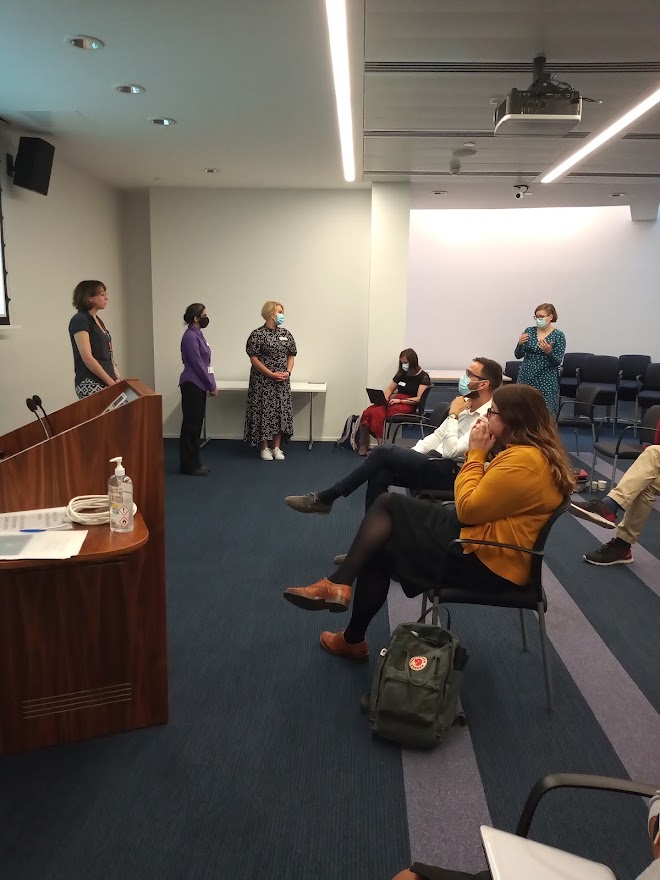The second edition of the NIHR Oxford BRC’s Next Generation Leaders Programme came to a successful close on 6 September with course participants presenting the healthcare research quality improvement projects that had been working on.

The Next Generation Leaders Programme has been commissioned and designed by the Oxford BRC to enable early to mid-career researchers and health professionals to develop key skills in leadership and management capability.
The final session of this year’s course saw the 25 participants present the outcomes of the projects they had been working on as groups for the past six months to their mentors and invited stakeholders.
These projects addressed questions like: how to provide resources and skills to nurses and allied health professionals into research; providing a common research platform for researchers and clinicians to collaborate; improving the reporting of patient and public involvement activities in BRC themes; facilitating collaborations between academia and industry, and organising webinars for radiographers.
Speaking to the participants about her own career development, the BRC Director, Professor Helen McShane, said: “Leadership for me is about supporting the next generation and creating a facilitating environment that allows others to flourish. It’s because of that that the BRC runs these leadership courses – we want to nurture the next generation of leaders.”
She encouraged the aspiring leaders to get as much exposure as possible to different kinds of leadership to work out which aspects they could adopt as they developed their own authentic leadership styles. She also advised them to put their “heads above the parapet” when opportunities arise.
Some of the participants explained what they hoped to get out of the course.
Avneet Gill, a senior research radiographer, said: “I joined the course because I’d recently had two promotions, and I found it hard to see how to progress further in the clinical professional of radiography. I wanted to see how enhancing my own leadership skills would help me to move up. I’ve learned a lot about things like emotional intelligence and understanding ourselves as well as our team members.”
Dr Jenny Rayner, clinical lecturer in cardiovascular medicine, added: “I felt like there was a big gap between where I was sitting and where ‘leaders’ were, and I was trying to work out how I could make the jump to become a leader. This course has helped me address what I think that gap is – whether there is actually a gap. It’s been fascinating to explore that.”
Linxin Li, a clinical research fellow in stroke medicine, said: “I used to think as researchers or clinicians, we didn’t need to be leaders. We would just work in our own specific areas, and I took the course to see if that was true. I now understand that in our everyday clinical or research work, leadership is important.”
During the six-month course, participants covered topics such as healthcare leadership, the fundamentals of team dynamics, building sustainable change, mediation skills, process-based decision making, influence principles and tactics, healthcare and research finances, innovation, bullying harassment and negotiation.
They attended six full days, one day a month. Each session started with a guest speaker talking about their personal journey and what they have learned about leadership along the way. The rest of the day included a mixture of interactive workshops, skills sessions and project work.
“The NIHR Oxford BRC is committed to the training and development of the next generation of leaders in translational research. The aim of this course was to develop capacity in this vital cohort and support the next generation of emerging leaders to enhance career opportunities and the talent pipeline,” said Dr Lorna Henderson, the Oxford BRC’s Senior Manager, who founded the Next Generation Leaders programme, with the BRC Chief Operating Officer, Dr Vasiliki Kiparoglou.
“We are also committed to promoting equality, diversity and inclusion in our workforce and set out to ensure a broad range of participants from the numerous applications to reflect such diversity in line with our EDI policy.
“I was delighted to have the opportunity to teach a session on leadership and innovation in the context of healthcare and was struck by the commitment and progress of the course participants, despite the challenges of online learning during the COVID 19 pandemic.”
Dr Henderson added: “Their end-of-course presentations were superb, and demonstrated understanding of the principles of change and influence in leadership, with many providing tangible results.”
The BRC is planning to run the course again from January 2022, as well as an advanced senior leadership course. If you are interested in taking part, contact karen.bell@medsci.ox.ac.uk.